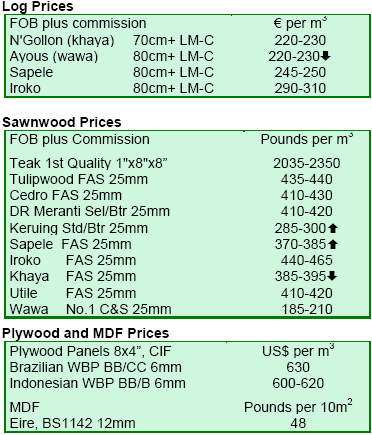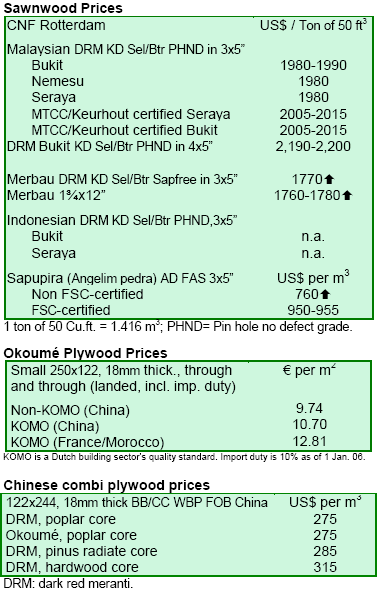|
Report
from the UK
House prices reach unseasonably strong levels
House prices were "unseasonably strong" in September according to the Nationwide Building Society (NBS). A NBS housing survey found prices rose 1.3% during the month lifting the annual rate of growth to 8.2%. The gain was the fastest annual growth rate since February. Prices were 2.2% higher in the third quarter of the year, compared with the previous quarter.
Meanwhile, house builders Barratt Developments saw its 14th year of growth despite a demanding first half and increased competition in the marketplace. Plumbing and building group Wolseley reported annual profits up by 15.6%. Wolseley¡¯s UK revenues grew by 14.4% despite noticeable delays in government spending on social housing. In contrast, furniture group MFI sold its loss making retail business for a nominal £1 and a £100 million as a dowry for the group¡¯s name.
Window makers shift from PVCu to timber
The TTJ reported an improving market for joinery amid high energy costs and possibly higher interest rates. The wooden window sector had seen an improvement as a swing away from PVCu in favour of timber became more apparent. However, selling prices remained stubbornly level with little opportunity to improve. The journal reported that the overall consumption of hardwood in the
UK was £204 million while its imports reached 660,000 m3 in 2005.
The Confederation of British Industry (CBI) reported a strong picture for manufacturing industry; with companies' order books this month rising to their highest level since December 2004 and export orders also recovering. A balance of 14% of firms expected that output would rise over the next three months, but price expectations, which rose to their highest level for 19
months in July, had edged lower.

Report
from Netherlands
Indicators point optimism for the economy
The new Parliamentary Year begun in the Netherlands and the inaugural speeches delivered by the Queen, the Prime Minister Peter-Jan Balkenende and the Finance Minister Mr Gerrit Zalm (who presented the 2007 budget) reflected optimism. Growth seems evident and higher than anticipated in various sectors of the economy. In the building sector, the engine for timber consumption, the completion of 81,000 houses was forecast for 2006, a record high for long time. However, some analysts
thought the forecast was too optimistic as 26,000 units were completed in the first half of 2006 (up 12% from 2005).
Other indicators supported the good momentum that the building sector was undergoing. The Central Bureau of Statistics (CBI) reported 49,000 new building permits in the first half year of 2006, up 34% from 2005. The turnover of the building sector rose 7.5% during the same period. The Dutch building sector was an important source for work, accounting for 463,000 jobs or 6% of the national working force. However, the sector¡¯s prosperous outlook was raising fears of labour shortage as the
baby-boom generation prepared for retirement.
Demand eases but prices remain firm
Demand for dark red meranti (drm) finished and semi-finished products was increasing in the joinery sector. Finger-jointed/laminated meranti (lamscants) enjoyed a good demand and certain mouldings such as glass beads were selling well. Some joineries were insisting in speedier deliveries.
There was active trade of meranti, sapele and sapupira rough sawn timber, tough less dynamic than in the May-mid July period due to adequate inventory levels. Demand for meranti sawnwood continued to be quiet although some traders reported activity for quick deliveries of drm 3x5¡± and particularly 4x5¡±. Items in thickness 7/4¡± and, to a lesser extent, 2 1/2¡± were trading slowly. Overall, the CNF Rotterdam level of most meranti products remained extremely firm and changes were not
likely in the short term.
Supply depends on monsoon and Ramadan periods
Meranti importers who took good unsold forward positions in previous months were not so active replenishing stocks during the second half of September due to slow sales. The reduced number of inquiries did not seem to affect Malaysian exporters since their unsold forward positions remained limited. Tight log supply was expected to deteriorate in coming weeks due to the
approaching monsoon downpours and the fasting month of Ramadan which started on 24 September.

|